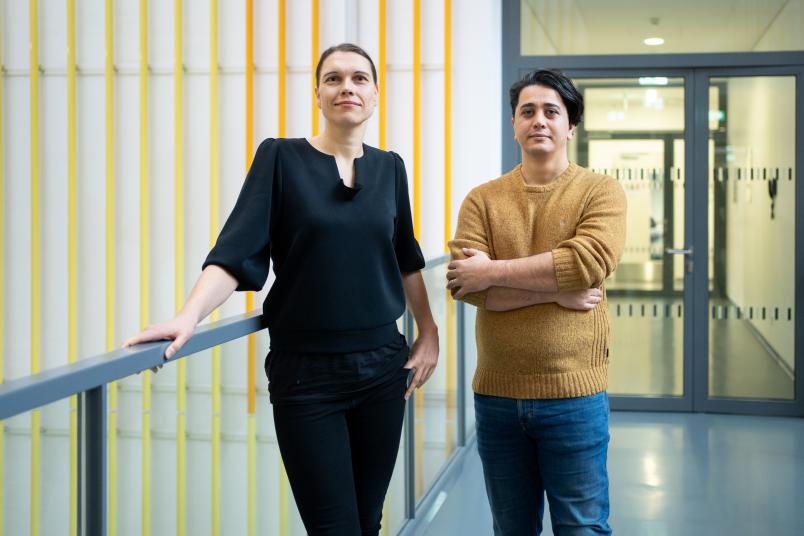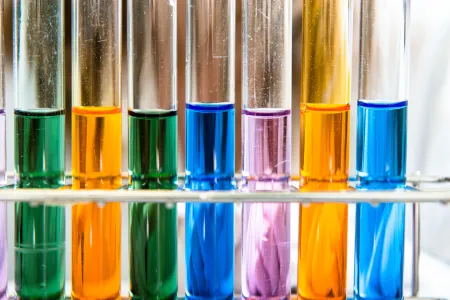
Electrochemistry
How Catalysts Secretly Lose Their Stability
Covalent organic framework compounds are more active as catalysts than one would expect. Researchers have now discovered why.
Covalent organic frameworks (COFs) are less stable as catalysts than previously thought but remain highly active. COFs are promising designer catalysts, for example for the sustainable production of chemicals and fuels. Their properties can be adjusted very specifically to catalyze a desired reaction based on their precise tunability, both in terms of molecular structure and chemical compositions. However, researchers at Ruhr University Bochum, Germany, and the Max Planck Institutes for Solid State Research (MPI-FKF) and for Sustainable Materials (MPI-SusMat) have shown that the catalytic activity is not generated by the COFs themselves. Instead, the cobalt ions detach from the scaffold and transform into oxidic nanoparticles that actually facilitate the catalysis. The team describes the results in the journal Advanced Science, published online on November 26, 2024.
“With the knowledge gained from this study, we will be able to design catalysts from organic frameworks and nanoparticles that are significantly more efficient than COFs designed before,” says Professor Kristina Tschulik from Ruhr University Bochum and the RESOLV Cluster of Excellence, who came up with the idea for the study jointly with Professor Bettina Lotsch from the MPI-FKF. “As an electrochemist, I've always wondered a bit about how the catalytic activity of COFs actually comes about,” says Kristina Tschulik – she wanted to find out more.
Stable under harsh reaction conditions?
The Bochum-based group led by Kristina Tschulik started a collaboration with researchers from Stuttgart led by Bettina Lotsch, who are experts in the synthesis of COFs. Both teams are part of the Collaborative Research Centre 1333, based at the University of Stuttgart. Researchers around Pouya Hosseini, Andrés Rodríguez-Camargo and Liang Yao analyzed the catalytic activity of several cobalt-containing COFs in the so-called oxygen evolution reaction. This reaction occurs in many industrially important reactions, for example in the electrolysis of water to produce hydrogen. “The reaction conditions in the oxygen evolution reaction are harsh,” explains Kristina Tschulik. “There is actually only one catalyst – iridium oxide – that remains stable.” However, an increasing number of studies have reported that COFs are also long-term stable in this reaction.
In the first step, the research team analyzed the COFs electrochemically during the oxygen evolution reaction. In fact, the conversion took place with high activity over several cycles. However, Kristina Tschulik had already seen the recorded current potential curves in a different context. As part of the Collaborative Research Centre 247, the scientist has been working for seven years with cobalt oxide nanoparticles as catalysts that generate precisely this curve shape. The group therefore started a more complex material characterization, supported by a team of researchers from MPI-SusMat led by Christina Scheu, who are experts in electron microscopy.
Scaffolds prevent nanoparticles from clumping together
These analyses showed that oxidic cobalt nanoparticles are formed from the cobalt-containing scaffold compounds, which take over the catalytic work. This conversion takes place immediately when the electrode is immersed in the basic solution. “However, the porous COF scaffolds still fulfil an important purpose,” says Tschulik, explaining another result of the analyses. “They provide a suitable reaction environment and hold the nanoparticles in place. Normally, the particles tend to aggregate, which means that less of their catalytic surface is accessible and they deactivate.”
In their publication, the authors also provide suggestions on how catalyst-loaded COFs could be produced in a targeted manner in the future so that they remain stable and catalytically active even under harsh reaction conditions.
